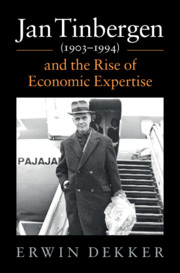Book contents
- Jan Tinbergen (1903–1994) and the Rise of Economic Expertise
- Historical Perspectives on Modern Economics
- Jan Tinbergen (1903–1994) and the Rise of Economic Expertise
- Copyright page
- Dedication
- Contents
- List of Figures/Tables
- Preface
- Acknowledgments
- Part I Becoming an Economic Expert
- Part II The Years of High Expertise
- 8 From The Hague to Geneva
- 9 Fascism at Home
- 10 Tinbergen’s Theory of Economic Policymaking
- 11 The Expert in the Model, the Economist outside the Model
- Part III Global Expertise
- Part IV The Limits of Expertise
- Bibliography
- Index
- Series page
8 - From The Hague to Geneva
The World Order of the League of Nations
from Part II - The Years of High Expertise
Published online by Cambridge University Press: 11 June 2021
- Jan Tinbergen (1903–1994) and the Rise of Economic Expertise
- Historical Perspectives on Modern Economics
- Jan Tinbergen (1903–1994) and the Rise of Economic Expertise
- Copyright page
- Dedication
- Contents
- List of Figures/Tables
- Preface
- Acknowledgments
- Part I Becoming an Economic Expert
- Part II The Years of High Expertise
- 8 From The Hague to Geneva
- 9 Fascism at Home
- 10 Tinbergen’s Theory of Economic Policymaking
- 11 The Expert in the Model, the Economist outside the Model
- Part III Global Expertise
- Part IV The Limits of Expertise
- Bibliography
- Index
- Series page
Summary
Chapter 8 analyzes his work for the League of Nations, which resulted in the first macro-econometric model of the US economy. The League’s Economic and Financial Section was a hub of economic expertise in the 1930s. Before Tinbergen arrived, Gottfried Haberler had produced an overview of the business-cycle theories. This chapter argues that the projects of Haberler and Tinbergen are best understood as outcomes of joint work under the supervision of Arthur Loveday and Dennis Robertson, with the help of assistants, coauthors, and expert committees. Although commissioned and published under the names of particular authors and understood as monographs, the studies are attempts to create expert consensus. A detailed study of the Tinbergen report demonstrates at once the various coauthors and internal critics involved and the contested nature of virtually all aspects of the study, as well as the potency of this new teamwork, without which the study would have been impossible. That this report was meant to forge expert consensus means that the critique of John Maynard Keynes of both studies should be understood partly as a challenge to the League of Nations as an institution, and partly to this new type of consensual expert knowledge more broadly.
- Type
- Chapter
- Information
- Jan Tinbergen (1903–1994) and the Rise of Economic Expertise , pp. 163 - 191Publisher: Cambridge University PressPrint publication year: 2021

